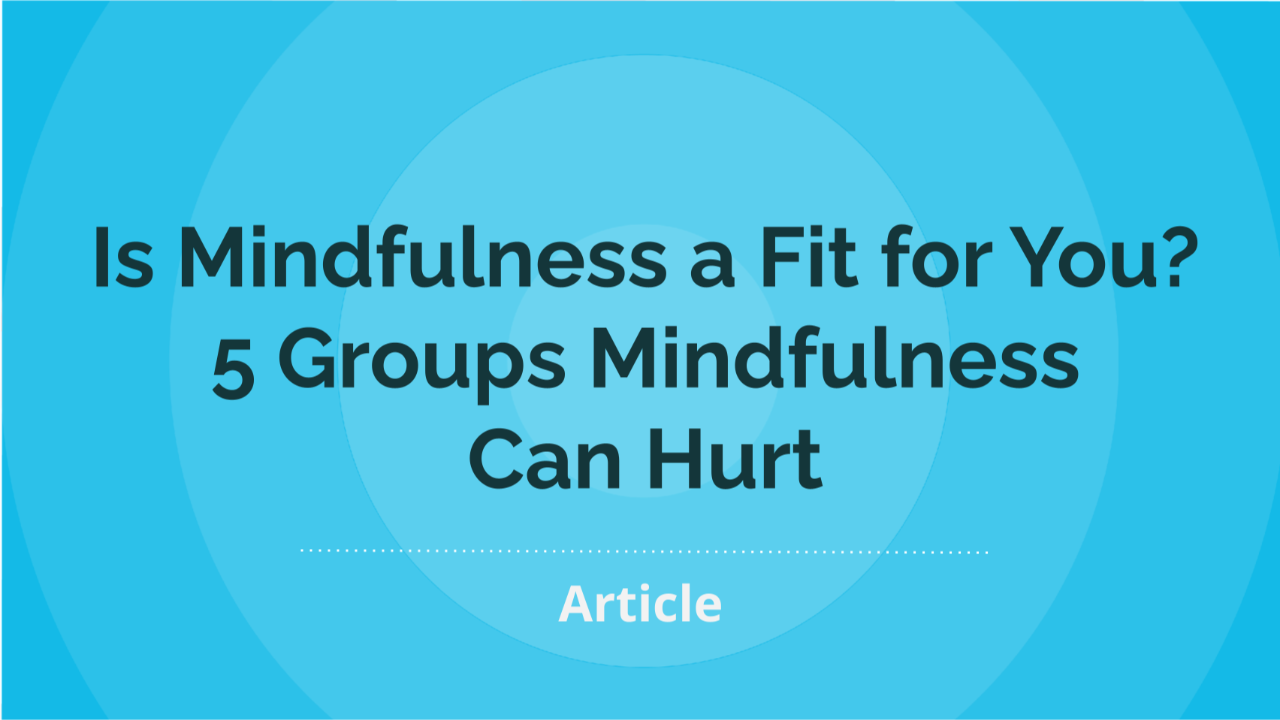Is Mindfulness a Fit for You? 5 Groups Mindfulness Can Hurt
Jan 31, 2023
Researchers are finding that mindfulness is not “one size fits all”. There are certain groups of people who may not benefit from mindfulness practice, and in fact, may actually be harmed by it.
Just like with physical exercises, it’s essential to understand an individual's history, their current challenges or unique situation, and to be familiar with adapting mindfulness practices based on their needs. Adapting mindfulness practices will help individuals experience mindfulness more safely and effectively and support their path to greater health and well-being.
In a recent talk at the Mindful Society Global Institute, Dr. Zindel Siegel, a co-creator of the Mindfulness-based Cognitive Therapy program, shared that,
It is common for many people to have an increase in challenging experiences when first starting a program, but these challenges are likely to subside over time. For some though, these adverse effects could intensify, and additional support is needed.
This increase in challenging experiences, also known as “negative affect”, may be due to the enhanced awareness that mindfulness practice cultivates and the direct attention placed on sensitive issues that many programs guide participants to observe. For example, in mindfulness-based programs like Mindful Self-Compassion, a common challenge known as “emotional backdraft” may occur when a practitioner “opens the door” to self-compassion in a way they aren’t ready to manage.
While obstacles are common, and some would say an essential part to develop insight in contemplative practice, certain groups may need additional support and even to hold off from mindfulness entirely until they’re in a better state to practice.

Five groups with a higher likelihood of challenging experiences with mindfulness
The emerging research shows five groups of people may experience mindfulness practices differently. For example, they may have a higher likelihood of having adverse experiences, or even pain, if practices are not adapted to suit their needs.
The five groups who have a higher likelihood of having adverse experiences without adapted mindfulness practices include:
- Trauma survivors who have not resolved their trauma
- People experiencing major depression and/or anxiety
- People experiencing psychosis and/or suicidal ideation
- Chronic pain sufferers experiencing acute symptoms of pain
- Neurodivergent communities with unique brain profiles
To create the safest and most effective mindfulness practice possible, it can be helpful to understand what kind of experiences people in these groups can have. Below is an overview of each group and their adverse experiences.
1. Trauma survivors
Everyone comes with their own personal lived experience and history. Traumatic experiences exist on a spectrum of intensity, and some people may not even remember a profound event. Even if the trauma is regarded as minor or there is no memory of it, there is still a chance for adverse experiences during mindfulness practice.
Adverse experiences may include: re-experiencing the trauma through reliving or remembering difficult or traumatic memories, feeling body sensations in relation to the trauma and more.
2. Major depression and/or anxiety
The most widely experienced mental health conditions include anxiety and depression. Both are characterized by enduring ruminative and emotional states that affect people’s lives. While it’s common to experience low levels of anxiety and low mood, clinical or major anxiety and depression can create particular challenges in a person's life, especially when attempting to practice mindfulness meditation. Therapeutic and clinical mindfulness programs should implement screening programs to identify the likelihood of someone experiencing major depressive or anxious symptoms, to make sure they have the proper support through the program and to see if it is a good fit.
Adverse experiences may include: panic attacks, increased general anxiety, lower mood, increased self-judgment and more.
3. Active psychosis and/or suicidal ideation
A disruption to a person’s thoughts and perceptions can make it difficult to recognize what is real and what isn’t. While not prevalent to everyone experiencing a psychotic episode, suicidal ideation is associated with it. Just as other mental health conditions should screen before engaging in mindfulness programs, with support put in place, this group could be at a higher risk of experiencing harm and require additional support and clinician expertise while engaging in mindfulness.
Adverse experiences may include: increased psychotic or delusional symptoms, dissociation or depersonalization, fear or terror, increased suicidal ideation and behaviour, and more.
4. Chronic pain
Chronic pain is pain that endures over a long period and can be associated with a chronic health condition (such as arthritis or cancer), post-surgery recovery, and embodied experiences of trauma. While practicing mindfulness, the enhanced awareness of pain may create increased challenging experiences. Pre-screening chronic pain can inform when to adapt practices and to put in supports, like anti-gravity chairs, to alleviate as much pain as possible to enable safe and effective practice.
Adverse experiences may include: increased stress, physical tension, enhanced experiences of localized pain, and more.
5. Neurodivergent communities
Neurodiversity is a term used to describe the diversity of human brain profiles and how they experience the world. Regarding mindfulness, neurotypicals have informed much of the research and what we know about how people experience mindfulness. As research into mindfulness grows, we’re learning that those who are neurodivergent experience the world, including mindfulness, differently. By understanding the unique needs of neurodivergent communities, we can make mindfulness more accessible to them. If you’re interested in learning more about neurodiversity-informed mindfulness, click here.
Adverse experiences may include: focusing on the breath may feel constricting in the body, sounds of the bell may hurt or cause pain, sensory overload can lead to increased anxiety, panic attacks and shutting down and more.
With research on adverse effects still in its infancy and no clear way to report adverse effects during mindfulness practice, this list is just the beginning of understanding the individualized needs people require to experience the science-based benefits of mindfulness.
We’ve identified eight steps to deliver mindfulness safely and effectively that can help you when offering mindfulness or practicing yourself. Download the eight steps by clicking here.

Michael Apollo MHSc RP is the founder of the Mindful Society Global Institute. Prior to founding MSGI in 2014, he was the Program Director of Mindfulness at the University of Toronto. He is an educator, licensed mental health clinician and certified facilitator in Mindfulness-Based Stress Reduction and Mindfulness-Based Cognitive Therapy.
References:
Join our weekly newsletter for insightful articles and free events
Be the first to learn about upcoming FREE events, receive early bird pricing for courses and stay in touch with weekly newsletters!


